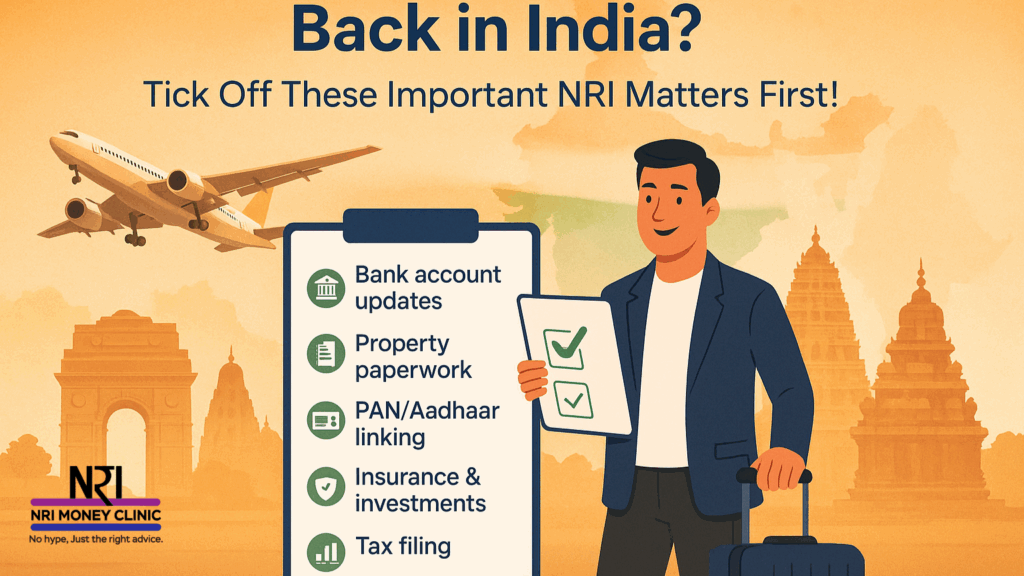Many NRIs visit India only to find themselves tangled in a web of “India issues”—OTP not working abroad, bank accounts in a mess, property taxes unpaid, or KYC records outdated.
The truth? Most of these headaches can be avoided with a little preparation and a focused to-do list during your visit.
Here’s your 8-point action plan for your next trip to India so you can stop complaining about the system—and start enjoying your stay.
1️) Fix Your Bank Accounts
Your banking should work for you, not against you.
Convert old savings accounts into NRO accounts (mandatory for NRIs).
Open both NRE and NRO accounts—they serve different purposes.
Ensure EMIs, if any, are debited from the correct account.
Keep accounts in two large banks with good IT infrastructure (think ICICI, HDFC, SBI, Axis) for smoother overseas transactions.
Close all unused accounts from student or job-hopping days.
Complete your KYC with updated passport, visa, address, email, and phone number.
2️) Update Your Investments
Old mutual fund folios and demat accounts opened before you became an NRI may still reflect “Resident” status. This can cause transaction conflicts.
Convert them to NRO demat and NRI folios.
If fintech platforms can’t fix your status, sell and start fresh.
Consider working with a financial planner—you get a problem-solver in your corner.
3️) Check Your PAN Card
Your Permanent Account Number is your financial identity in India.
Ensure name, date of birth, and father’s name match your passport, Aadhaar, and bank records.
Apply for an e-PAN for easy digital access.
Make sure your NRI status is updated in the IT portal.
Link your PAN and Aadhaar to avoid compliance issues.
4️) Set Your Aadhaar Card Right
If you don’t have an Aadhaar card, get one during your visit.
Already have it? Check for:
Matching name, DOB, and address with other IDs.
Correct email and Indian phone number (overseas numbers aren’t accepted).
You can update your name only once in a lifetime—so be precise.
5️) Get an Indian Mobile Number
This one’s a game-changer for OTPs and verifications.
Opt for postpaid to avoid losing the number during inactivity.
Inform your telecom provider you’ll be abroad so you can receive OTPs overseas (fees may apply).
If you can’t get one, have a trusted family member hold it for you.
6️) Build a Relationship With a Chartered Accountant
A good CA is your India-side financial guardian. They can:
File your taxes on time.
Handle TDS mismatches.
Help with property sales and compliance.
Monitor your PAN-linked financial activity to avoid unwanted notices.
7️) Sort Out Property Matters
NRIs love buying property, but often neglect maintenance.
Pay property taxes and society maintenance dues promptly.
Clear any utility bills.
Have a trusted local contact to handle upkeep and payments when you’re abroad.
8️) Check on Your Parents
For many NRIs, visiting India means visiting parents—but make it meaningful:
Assess their living conditions and safety.
Encourage them to live in safer, well-connected areas.
Review their financial and health situation.
If their health insurance is outdated or inadequate, upgrade it—it protects you from sudden medical bills too.
Final Word
A little planning can save you years of frustration.
On your next trip:
Add 2–3 days for these essential tasks.
Keep documents ready.
Work through the checklist one by one.
By the time you board your return flight, you’ll have fewer India headaches, smoother financial dealings, and peace of mind—no matter where you live.
What’s the one India-related issue that frustrates you the most as an NRI?
Share it in the comments—we might just cover it in our next guide.









No comment yet, add your voice below!